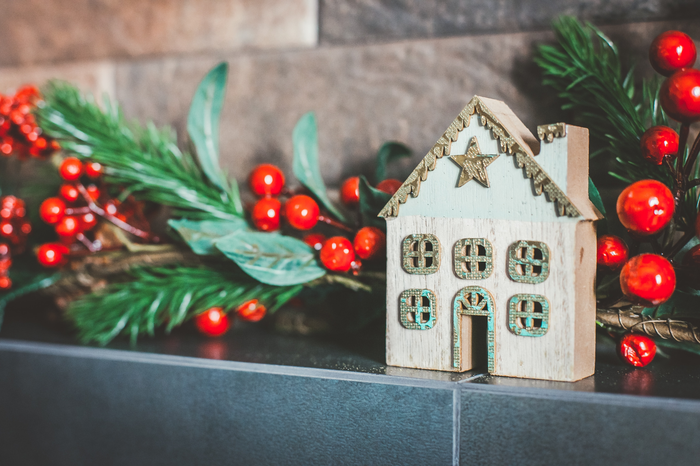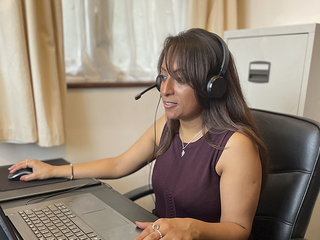Making decisions about your Christmas plans if you have blood cancer
If you’re finding it hard to plan or think about Christmas this year, here are some things that might help you with decision-making and techniques for coping with uncertainty.

Blog updated 3 November 2021
If you have blood cancer, you'll probably be thinking about the risk that covid poses to your health, and trying your best not to catch it.
For everyone, the more people you mix with, the greater your chance of coming into contact with coronavirus. But if you have blood cancer, there's also a chance the vaccine hasn't worked as well for you.
This makes it difficult to think about mixing with people over Christmas. But it's also hard to think about not seeing your loved ones, especially if you’ve been shielding for most of the pandemic.
Here we’ve put together some practical ideas to help with decision-making and coping with uncertainty.
Making decisions that are right for you
Beyond following the national rules and guidance, you will ultimately be making your own decisions about what to do and what not to do. This can feel like a burden, but there are things that can help you make these decisions.
Whatever you choose to do, make sure that you feel comfortable with your own decisions – that you don’t feel pressured into doing anything you’re uncomfortable with, and equally that you don’t feel guilty about doing things that are important to you.
Beyond following the national guidance, there is no right or wrong way to behave. It is down to you as an individual to decide the right balance for you, between protecting yourself from the virus and maintaining your quality of life.
What you choose to do will depend on your understanding of your level of risk, your healthcare team's advice, and the mental and practical impact of avoiding the virus.
Below are some ideas that might help you weigh things up.
1. Understand your own level of risk
Every person’s level of risk is unique to them and depends on many things. Not everyone with blood cancer has the same level of risk of getting seriously ill if they get coronavirus.
Your particular condition and treatment, as well as your general level of fitness, are important factors.
That’s why it’s so important to talk to your healthcare team about your level of risk and what precautions would be sensible for you.
It might be worth looking at how many coronavirus cases there are in your local area, and in the local areas of people you are thinking of mixing with. If the rate is higher, you may want to take greater precautions about seeing people.
You can do this by entering your post code on this BBC page: How many coronavirus cases are there in your area? Data comes from all four UK governments.
3. Prioritise who you see in person
The fewer people you see, the lower the risk.
Although it might feel strange, you might want to think about prioritising who you choose to spend time with in person. This might be based on who is most important in your life, or it might be based on where people live and how much they themselves are mixing with others.
At Christmas, this might feel really unnatural, but you’ll need to balance keeping yourself safe, with being able to do the things that are most important to you. There are lots of other ways to stay in touch too, if you’re not seeing people in person.
How to say no
Once you’ve made some decisions about how you’ll spend Christmas, you might be feeling unsure about talking to family and friends about this.
Remember, it’s up to you what precautions you take. Everyone has their own personal take on what they feel comfortable with, and however you’re feeling is valid.
It’s also fine to change your mind – these are difficult decisions to make.
Here are some examples of things you might want to say:
- “I would really love to be able to see you, but unfortunately…”
- “I’m still trying to limit the number of different people that I see.”
- “My healthcare team are telling me to remain extra cautious”
- “Getting any infection can be dangerous for me, and I need to be extra careful about coronavirus”
- “I hope you can understand”
- “Can we arrange a phone call/video call instead, so we can still see each other?”
Remember, as someone with blood cancer, you have reason to be concerned about coronavirus. It’s important that you don’t do anything you feel uncomfortable with.
You might find that some family and friends don’t react how you would like them to. You might even feel guilty. But you can’t control the feelings of others, and it’s natural for them to feel disappointed about not seeing you. Give them a bit of time and space to process their feelings.
You can talk to our Support Services Team for help thinking about risks and decisions, or for tips on communicating with family and friends. Other people with blood cancer might also have helpful advice in our online community forum.
When you can’t see other people
There might be many people that are important to you that you can’t see in person over Christmas. You might be restricting who you see quite a lot, which probably doesn’t feel nice.
But there are many different ways you can spend Christmas ‘together’ whilst not physically together.
There might even be benefits, like not having to travel, being able to be more flexible, and being able to get a group together who don’t usually all meet in person.
- Plan a particular day or weekend next spring to have a get-together, when rates will hopefully be lower than winter. This also gives you something to look forward to.
- Keep in touch with people – Arrange video or phone calls with friends and family. That will give you something to look forward to, and mean that you’re still spending time together. You might be able to stagger a few over the Christmas period.
- Send Christmas cards – it’s another way to stay in touch and connect with others.
- Do things at the same time so it feels like you’re together – You could cook and eat a meal at the same time, or watch the same film or sports game.
- Plan alternative ways to socialise – Many games and quizzes can be done over a video call. Can you re-create any of your usual Christmas traditions? Other people with blood cancer might have ideas in our online community forum.
- Secret Santa by post – there are many Secret Santa websites that can allocate names randomly within a group for a gift exchange. Gifts can be posted and maybe everyone could open their gifts at the same time?
- Talk to us – We know this is a difficult time for many people, and we’re here if you want to talk – contact our Support Services Team on 0808 2080 888 or [email protected] to talk about any worries or questions you have.
Coping emotionally
As someone living with blood cancer, you have probably been through a lot this year, and Christmas may be presenting its own challenges.
You might feel that you’ve already missed out on so much, and feel angry or sad about having to restrict yourself over Christmas as well.
You may be feeling stressed about the uncertainty, worried about your own risk, or worried about the wider impact of households mixing in December.
Whatever you are feeling is valid, but talking about it might help:
- Read our information on coping with risk and uncertainty.
- Share your worries with your family or friends if you can – talking to people you trust can help.
- If you’re worrying about the future, try some of our guided relaxation and mindfulness exercises.
- Talk to other people with blood cancer in our online community forum. They probably have similar worries and could give you tips from experience.
- Talk to us – Whatever you want to talk about, we’re here. Contact our Support Services Team on 0808 2080 888 or [email protected]
If you do see other people
If you do spend time with others, there are practical things you can do to lower the risk as much as possible:
- Outside is safer than inside – can you wrap up and see people outside for a walk, rather than in the home?
- Could you ask people you’d like to see in person, whether they can take a rapid lateral flow test before they see you? These aren't 100% accurate, but they can give you some added reassurance.
- Remember the main ways to avoid catching coronavirus are still: avoiding close contact with other people, keeping your hands clean, not touching your face with your hands. Continuing to do these things will reduce your risk.
- Keep shared spaces ventilated – can you keep windows open and wrap up warm?
- Keep visits shorter and don’t stay overnight – the less time you spend with other people the lower the risk.
- Wear masks – wearing face masks indoors and outdoors can reduce the risk of someone passing on coronavirus if they don’t know they have it.
- Don’t share food, cutlery, tea towels, bath/hand towels, or other things that touch your face.
- Stay two metres apart wherever possible.

Worried about anything or have questions?
If you need someone to talk to, please don't hesitate to contact our Support Service by phone or email.
